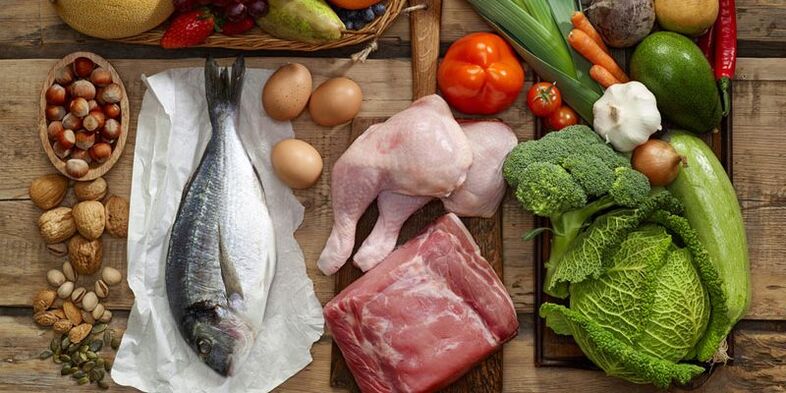
We have studied dozens of serious scientific research and collected diets that will certainly help you lose weight.You just have to choose the diet that will not force you to suffer and be part of your life.
1. Atkins diet
This low -content popular regime was developed in 1960 by cardiologist Robert Atkins.The diet includes several phases and aims to change eating habits to healthier eating habits.
What is the essence of the diet
The ATKINS regime does not include the calculation of calories or control of portions.The only thing to count is the grams of pure carbohydrates minus fiber.
The regime is divided into four phases:
- The first phase is the strictest, it lasts at least two weeks and allows you to lose 3-4 kg.For the moment, you reduce the amount of carbohydrates to 20 g per day, and you get 12 to 15 g from vegetables.You consume a lot of poultry, meat, fish and seafood proteins, eggs, cheese, while completely excluding fruit, sweet pastries, pasta, grains, nuts.It is necessary to refuse alcohol and drink eight glasses of water a day.
- You continue to consume 12 to 15 g of carbohydrates from vegetables and avoid sugar, but gradually return certain products rich in useful substances: nuts, seeds, berries.You lose weight and go to the next phase only when about 4.5 kg remains before your goal.
- You gradually present the foods previously prohibited on the menu: fruits, starchy foods, whole grain products.You can add 10 g of carbohydrates.But if you start getting weight again, you must return to the 20 g standard.In this phase, you stay until you reach your perfect weight.
- All products are authorized, but you continue to join the principles of the diet.If you start gaining weight, go back to the previous phase.

What science says
In 2007, the University of Stanford studied the effectiveness of four popular regimes: Atkins, Ornisha, "Zones" and Learn (low fat diet).After 12 months, Atkins seated on the diet lost 4.7 kg, 2.6 kg in the Learn diet, 2.2 kg in the Ornish regime and the "zone" diet - 1.6 kg.
In general, many studies confirm the advantages and efficiency of low -carb -content diets.For example, a recent scientific journal of six studies has shown that diets with a low glycemic index or low glycemic load allow you to burn an average of more than one kilogram more than the others, positively affect body weight, the amount of fat and cholesterol.
Another study has shown that rich protein -content diets and a low glycemic product index contribute to weight maintenance.
Damage possible
The article in the research center indicates that a diet with a sharp reduction in the number of carbohydrates may have the following side effects:
- Headache.
- Dizziness.
- Weakness.
- Constipation.
The Atkins diet is not recommended for people with kidney disease, women during pregnancy and breastfeeding, as well as for people with high physical activity.
It is believed that you should not constantly sit on diets with low carb content, as it can cause health problems.But scientists have not yet proven this.So, for the moment, it is best to consult a therapist.
2. Paleodite

In 2013, paleodity became one of the most popular in the world, although there is still no consensus among nutritionists, whether this diet is useful or not.
What is the essence of the diet
Paleodity is based on the products that our distant ancestors eat before the emergence of agriculture.
Supporters of the regime argue that, despite the thousands of years that have passed since that time, the human body is always best faced with the food of hunters and collectors.
The menu includes meat, fish, eggs, vegetables and fruits, nuts (except peanuts) and seeds.Ideally, meat should come from cultivated animals under natural conditions, without the use of a special diet.The game is also well suited.
The diet completely excludes sugar, starchy vegetables, dairy products and cereal products, oils (with the exception of cold olive presses, nut oils and avocados), legumes, tea, coffee, soft and alcoholic drinks, fruit juices.
What science says
In 2007, scientists compared the effect of Paleo- and Mediterranean regimes without calories.
After 12 weeks, people in paleodity lost an average of 5 kg (in the Mediterranean - 3.8 kg) and lost 5.6 cm in size (in another group - 2.9 cm).On average, the people of the Paleo group consumed 451 kcal per day less than in the control group and without any restriction.In addition, their blood sugar has normalized.
The advantages for the figure were confirmed in the 2009 study. For three months, a group joined the paleoodics, the other - an ordinary diet for diabetics.As a result, the first lost 3 kg more than the second.
A 2014 long -term study is also interesting.The subjects were divided into two groups: for two years, some joined the Paléodétistes, others - a diet rich in carbon with a small amount of fat.The group on paleodity has lost more fat, in particular the abdomen, after 6, 12 and 18 months.
Damage possible
Nutritionists call many possible dangers of paleodys, among which:
- Disadvantage of calcium due to the lack of dairy products.
- Damage of the state of the kidneys due to the consumption of a large amount of saturated protein and fat.
- Increased the risk of cardiovascular diseases due to the consumption of a large amount of meat.
However, despite the possible negative effects of the diet, no study clearly proves health.
3. Vegan diet

The term "vegan" appeared in 1944 thanks to the group of vegetarians who formed the society of vegans.They decided to stop exploiting animals in any form and abandon not only meat, but also eggs and dairy products.
What is the essence of the diet
The vegan diet does not include meat and poultry, fish and seafood, eggs, dairy products, as well as dishes that can include animal components: gelatin, casein, 2-hydroxypropal acid.
Plant products are consumed without any restrictions.Vegans eat legumes, tofu, nuts, seeds, vegetables and fruits, drink coconut and almond milk.
What science says
A randomized study of 2013 has shown that a low -fat vegan diet can considerably reduce weight.
After 18 weeks of research, vegans got rid of an average of 4.3 kg and people from the control group of 0.1 kg.The first in the first, the level of cholesterol and blood sugar has decreased.
Scientists received similar results in 2005. After 14 weeks, people who refused animal products launched 5.8 kg and people who replaced fats saturated with carbohydrates (NCP diet) - 3.8 kg.Vegans have also lost more centimeters at the waist.
A two -year study completed in 2007 also confirmed the effectiveness of a vegan diet to reduce weight.64 women with an excess weight adhered to a vegan diet or a PNP diet.As a result, a year later, vegans launched 4.9 kg, and participants in the NCP diet were 1.8 kg.According to the two -year results, weight loss in the vegan group was 3.1 kg and in the NCP group - 0.8 kg.
But in 2015, scientists compared the effectiveness of vegan, vegetarians, sandytarians (fish and seafood), semi-surtans (only red meat is impossible) and non-Heir diets to reduce weight.As a result, in six months, vegans lost an average of 7.5% of body weight - more than everyone else.
Damage possible
The main danger of a vegan diet is the lack of vitamin B12, necessary for human health and obtained from animal products.
B12 deficiency can be transformed into anemia, chronic fatigue, depression.In addition, the 2015 study has shown that the deficiency of this vitamin increases the risk of cardiovascular disease in vegetarians.Consequently, subject to a vegan diet, it is advisable to accept additives with B12.
As for the protein, it can be obtained from products.
4. Mediterranean regime with calorie restrictions

Unlike high -speed diets such as the Pamplefrutova, the Mediterranean cannot boast of quick results.However, it is much more effective in the long term and helps to maintain not only weight, but also health.In addition, the observation of this diet is easier and more pleasant, which also affects its effectiveness.
What is the essence of the diet
Here are the basic principles of the Mediterranean regime:
- The diet is fruits and vegetables, whole grain products, legumes, nuts, cheese and yogurt.These products can be eaten every day.
- Butter is replaced by olive and rapeseed.
- Red meat, eggs and candies should be consumed as little as possible, or can be completely excluded from the diet.
- Fish and bird should eat at least twice a week.
- You should drink six glasses of water a day.Sometimes you can drink red wine.
- You should add a little exercise.
What science says
Most studies on the Mediterranean diet concern its benefits for heart health.For example, Dr. Ramon Estruch attracted 7,447 people to his five -year study and has proven that the risk of stroke and heart disease in people under the Mediterranean diet is reduced by 28 to 30% compared to a low fat diet.
And although the Mediterranean diet is more often used to prevent cardiovascular disease, it is also effective in losing weight, especially in the long term.This is confirmed by many studies.
The meta-analysis of randomized controlled tests has shown that the Mediterranean diet can become a useful tool for weight loss, especially if you cut the calorie content of food.
5. The regime of an Ornisha

It is a regime poor in fat, invented by Dean Ornish (Dean Ornish), professor of medicine at the University of California.It aims to improve heart health, get rid of excess weight, reduce cholesterol and blood pressure.
What is the essence of the diet
The main rule of the Ornish regime - fats should not exceed 10% of the total calorie standard.At the same time, it is advisable to exclude meat and fish, butter and margarine, olives, avocados, seeds, nuts, fatty dairy products, sweet, alcohol.
In the diet may contain low dairy products, egg proteins, weak crackers.Without restrictions, you can consume legumes, fruits, cereals, vegetables.
In addition to the diet, Ornish advises to perform physical exercises (at least 30 minutes about five days a week or 60 minutes three days a week), cope with stress with yoga and meditation and spend time with loved ones.
What science says
The study of the Ornish, published in the International Medical Scientific Journal in 1998, showed that people who adhere to its diet were lost by 10 kg during the year, and after five years, they supported the weight, 5 kg of different from the original.
In the aforementioned study of the University of Stanford above, people who were seated in the Ornisa regime lost an average of 2.2 kg during the year.However, Dr. Michael L. en dansinger) obtained other results in 2005. During the year, Ornish subjects lost 3.3 to 7.3 kg at the Ornish regime and those who were seated at the Atkins diet 2.1–4.8 kg.
Damage possible
As in the case of a vegan diet, people under an Ornisha diet can suffer from a lack of protein and vitamin B12.Therefore, it is worth taking this vitamin in addition and most often includes legumes rich in vegetable protein in the diet.
What does that mean
As you can see, all the diets are very different.The Atkins diet limits carbohydrates, ornisha - fats.Paleods focuses on meat and vegan meat completely eliminates.In addition, scientific research confirms the advantages and efficiency of all these diets.And it's just wonderful!
Choose a diet that will not make you abandon your favorite products.You cannot live without meat, choose a Paleo or Atkins diet.The paste, becomes vegan or adhere to the Mediterranean power diet.If you can easily do without fatty foods, the Ornish diet will help you lose weight.













































